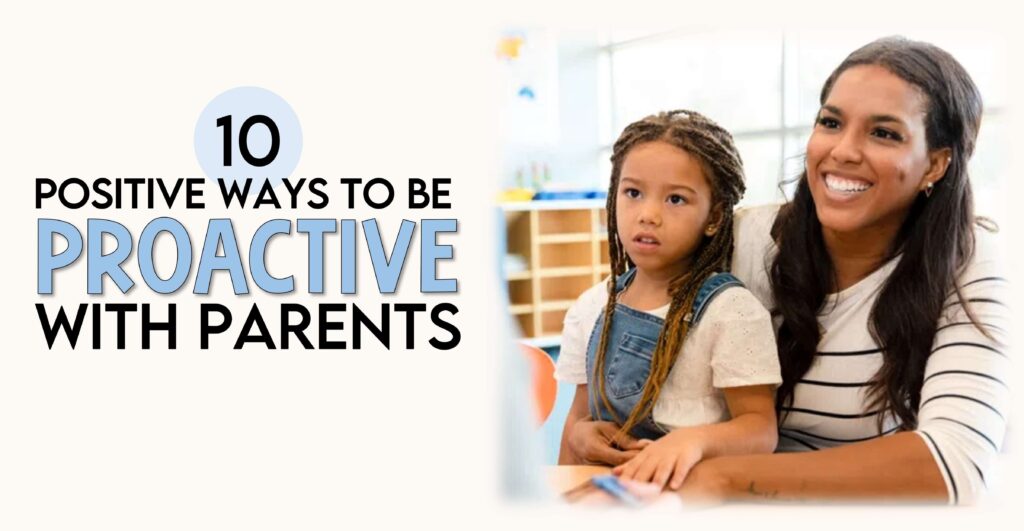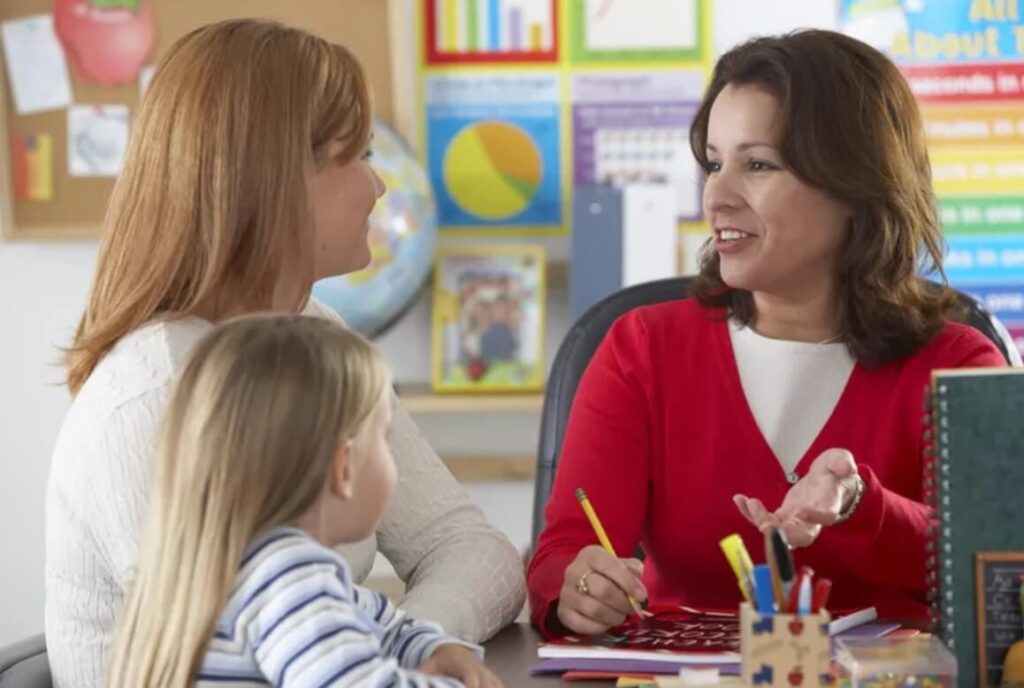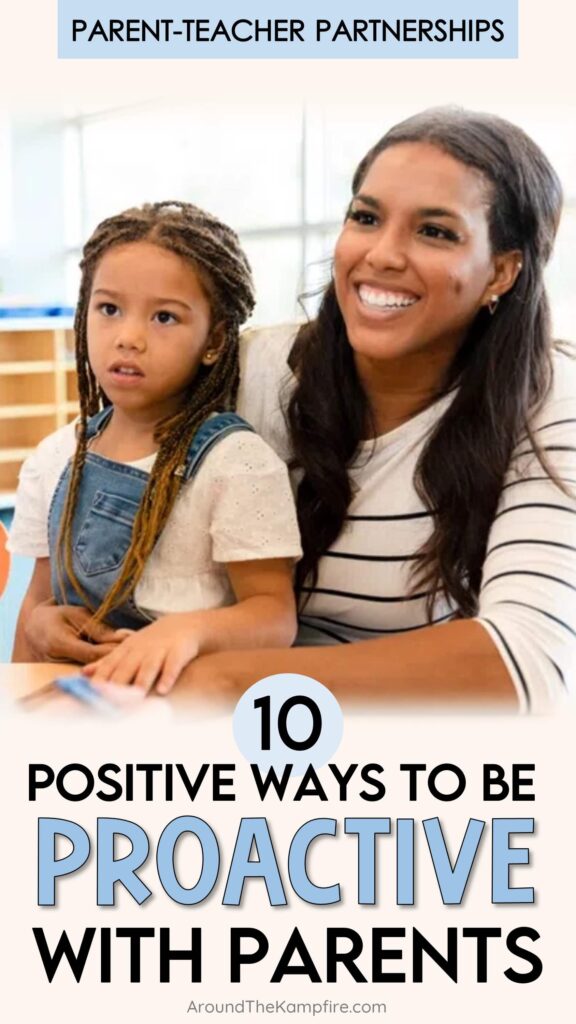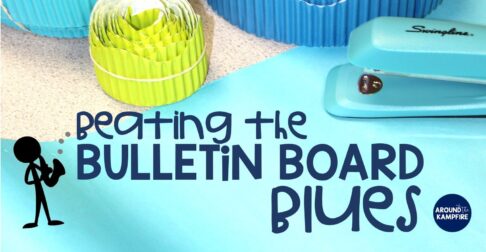When teachers take the time to reach out to parents early and often, it builds trust and rapport. This makes it much easier to communicate about academic progress, behavior concerns, and other important topics.
In this blog post, I’ll share 10 positive ways to be proactive with parents. These tips are easy to implement and can make a big difference.

Tips For Being Proactive with Parents
1. Reach out starting on day one
Reach out to parents at the beginning of the year and actively develop a relationship. Meet the Teacher Night is a great time for this. Touch base with all of your parents and have them fill out a “Tell Me About Your Child” form.
Take a first-day photo of each child and glue it into a simple sheet of folded colored paper with a note from you inside. Parents treasure these keepsakes.
2. Call before you need to
Be responsive to parents’ emails, phone calls, and messages. When parents reach out, make sure to get back to them.
Make a phone call, send an email, or a handwritten note with something positive about each of your students within the first month of school. Share good news. Do this for your high-needs students first.
You want the first contact to be a positive one before there is a negative issue that you need to call home about. Parents are much more open and responsive if they have a connection with you and a prior positive conversation.

3. Take an interest in their child and ask questions
This reassures parents that you have their child’s academic and emotional well-being at heart. Many misunderstandings are avoided when you have a relationship with parents.
At the beginning of the year send home a parent questionnaire to learn more about their child. I use a “Help me get to know your child” page at Meet the Teacher Night or a parent questionnaire conference form before conference time.
4. Help parents get to know you
Help them get to know you, your intentions, and the fact that you care about their child. As a parent myself, I know that all parents want is to know that you like their child and will treat them fairly and with respect. Let parents know how much you enjoy their child, share a story or moments that make you proud of them, as well as any concerns you have. Contacting parents about concerns is much easier after you have shared positive things prior.
Be welcoming and approachable. Parents should feel comfortable coming to you with questions or concerns.
5. Communicate regularly
Communicate regularly and consistently whether it be newsletters, notes sent home, through a parent communication app, comments in the homework folder, or even a word in the pick-up line after school.
Be transparent about your teaching practices and expectations. Parents want to know what their children are learning and how they can help at home.
This is a must when being proactive with parents.
6. Send a card over winter break
Another way to reach out is by sending a holiday card in the mail. One of the first things I do over the holiday break is to send a card to each of my students. I know not all of my students celebrate the same holidays in December, so I usually send a winter-themed card with snowmen on it.
Sending cards over the break also serves as a thank you card for the students who brought me a gift before the holiday. It takes time to write 27 or so handwritten cards and address them, but it means a lot to your students and to their parents.
And how often do kids get mail?

7. Attend things students invite you to occasionally.
Now I’m not saying you should go to everybody’s birthday party or every single thing you are invited to. But your presence at special events like a gymnastics match, a softball game, a swim meet, their piano recital, or the high school graduation of a former student means the world to them. The fact that they want you there speaks volumes.
I know that it’s not always possible when you have little ones at home, work another job, have health issues, are a single parent, or have a million other valid life reasons.
Try to make it up to them if you can’t make it to their event. Have the child eat lunch with you the next day, make them a card, or take a picture together, print it, and write on the back how proud you are of them and how much you wish you could have been there.
8. Invite parents to volunteer
Invite parents into your classroom to volunteer. Send home a letter early in the year to see which parents may be interested or able to come in. Not all parents can come into the classroom so I find things I can send home for them to do. Things like cutting out lamination, stapling journals together, leveling books for the classroom library, or whatever else lends itself to sending home.
This is truly a win-win as you are being proactive with parents, plus they are helping you with all that extra work!
9. Keep a stash of thank-you notes
There are three things I know to be true:
- It takes a village.
- I will be forever grateful to any parent who helps me.
- The school secretary is the glue that holds the universe together.
Any parent who sends me glue sticks is a rock star in my book. Keep a stash of simple thank-you notes in your desk drawer. Write a quick note to that goddess who sent you the glue sticks and place it in her student’s homework folder where she’ll see it. Download these FREE Thank-You Notes to use.
10. Keep parents connected to your classroom
One of the ways I keep parents connected to my classroom is to have students write weekly Friday letters to their parents or guardians. Let parents know at the beginning of the year that their child will be bringing home a letter and ask them to reply on the back of the page.
We save the letters and I bin them into a book at the end of the year as a keepsake for parents. Download this FREE Friday letter starter kit with an editable parent letter and some printable stationery to get you started.
Positive parent-teacher relationships are one of the keys to a student having a successful year. Be open to feedback. Parents have valuable insights into their children’s learning.

By following these tips, you can create a strong partnership with parents that will benefit your students! What other tips would you add to be proactive with parents?
Get more helpful tips and freebies for parent communication from these posts!
How To Prepare for Parent Conferences

Tips For Having Difficult Conversations With Parents







Leave a Comment